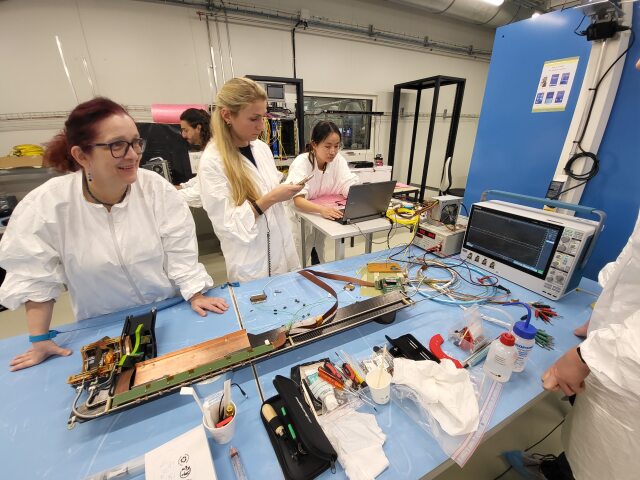BTU doctoral candidates involved in highly endowed "Breakthrough Prize"
"Oscar of science" for research at CERN
The Breakthrough Prize, awarded on 7 April 2025, is one of the world's most highly endowed prizes in the field of natural sciences - a total of three million US dollars and includes: one million US dollars each for the LHC experiments CMS (Compact Muon Solenoid) and ATLAS (A Toroidal LHC ApparatuS), 500,000 US dollars each for ALICE (A Large Ion Collider Experiment) and LHCb (Large Hadron Collider-beauty Experiment). Precise measurements of the properties of the Higgs boson were honoured - a milestone for understanding the mechanism of spontaneous symmetry breaking in the mass generation of fundamental particles. Also in focus: the discovery of new strongly interacting particles, the investigation of rare physical processes, research into matter-antimatter asymmetry and a look into nature under the most extreme conditions. All of this takes place at the unique research complex at CERN (the European Organisation for Nuclear Research), the Large Hadron Collider.
The Higgs boson - the key to understanding the universe
The Higgs boson, a new fundamental particle discovered in 2012 by the ATLAS and CMS experiments, which is also referred to in popular writings as the "God particle", is an excitation of the Higgs field - an invisible energy field that permeates the entire universe. The special thing about the Higgs field is that it gives other fundamental particles their mass. The stronger the interaction of a particle with the Higgs field, the greater its mass. The discovery of the Higgs boson by the ATLAS and CMS experiments at CERN in 2012 was a milestone in particle physics, confirming the prediction in the theory of physicists Peter Higgs and François Englert, among others, and enabling a deeper understanding of the fundamental forces of nature. Peter Higgs and François Englert were honoured with the Nobel Prize in 2013.
Investing in the next generation of research
The prize money is used in the experiments to provide doctoral candidates from the member institutes with scholarships for a research stay at CERN. This gives students the chance to gain experience at the forefront of science and bring new expertise back to their home countries and regions.
BTU is an associate member of the BRIL (Beam Radiation Instrumentation and Luminosity) group, which is involved in measuring the luminosity of the LHC storage ring in the CMS experiment. Luminosity is a key parameter of any experiment. High luminosity ensures high sensitivity to rare, previously unobserved phenomena, and accurate measurement is crucial for the precision of all measurements. This may enable physicists to discover new fundamental particles, investigate important properties of the Higgs boson and other subatomic particles and thus further deepen our understanding of the universe. Prof. Leen Lambers is currently involved in the CMS experiment at BTU.
Contact us

